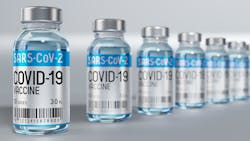Novel research sheds light on antibody responses to the SARS-CoV-2 virus and vaccines
Two studies presented at the 2022 AACC Annual Scientific Meeting & Clinical Lab Expo reveal how SARS-CoV-2 antibody levels vary among recipients of COVID-19 vaccines and naturally infected individuals.
These findings add to a growing body of knowledge that is essential for guiding public health initiatives, and that might one day enable clinicians to assess individuals’ immunity to SARS-CoV-2.
Researchers led by PhD candidate Mary Kathryn Bohn of the Hospital for Sick Children in Toronto, Canada, have found that children tend to have higher antibody levels against the SARS-CoV-2 virus following administration of mRNA vaccines than adults.
Bohn’s study enrolled 644 vaccinated participants (312 adults and 332 children) who ranged in age from 6-79 years, along with a control group of 168 individuals with no history of SARS-CoV-2 infection or vaccination. The researchers assessed participants’ blood samples using two commercially available coronavirus antibody tests.
The results from this showed that the mean antibody level (± standard deviation) in pediatric participants was 2,037 ± 1,515 binding antibody units/mL, while in adult participants it was only 1,444 ± 1,277 binding antibody units/mL—a statistically significant difference. Overall, among participants who received two doses of an mRNA vaccine at the time of blood collection, antibody responses decreased over time after the most recent dose. However, among a subset of 60 participants who were followed over a five-month period, antibody levels increased 10-fold after a booster dose. Nearly all (98%) people with no history of vaccination or known exposure to the coronavirus had negative antibody results. It’s possible the remaining 2% may have had exposures or asymptomatic cases, Bohn said.
Separate research led by Kimia Sobhani, PhD, of Cedars Sinai Medical Center in Los Angeles, studied characteristics associated with variable antibody responses to the Pfizer-BioNTech vaccine. Sobhani’s team measured the blood antibody levels of 843 healthcare workers at the medical center for 10 months after participants completed a two-dose vaccine regimen. Participants submitted a health questionnaire and at least two blood samples for analysis.
For the duration of the study, 99.6% of individuals remained positive for vaccine-induced antibodies against the virus’s spike protein. Those with prior SARS-CoV-2 infection had higher antibodies, as did females and younger participants (i.e., those below the median cohort age of 42 years). Additionally, those who did not have hypertension had persistently higher antibodies. However, prior SARS-CoV-2 infection modified the associations of hypertension—i.e., participants who had not been infected and who had hypertension had persistently lower antibodies, while prior-infected individuals who had hypertension exhibited relatively higher antibodies that remained higher over time.

